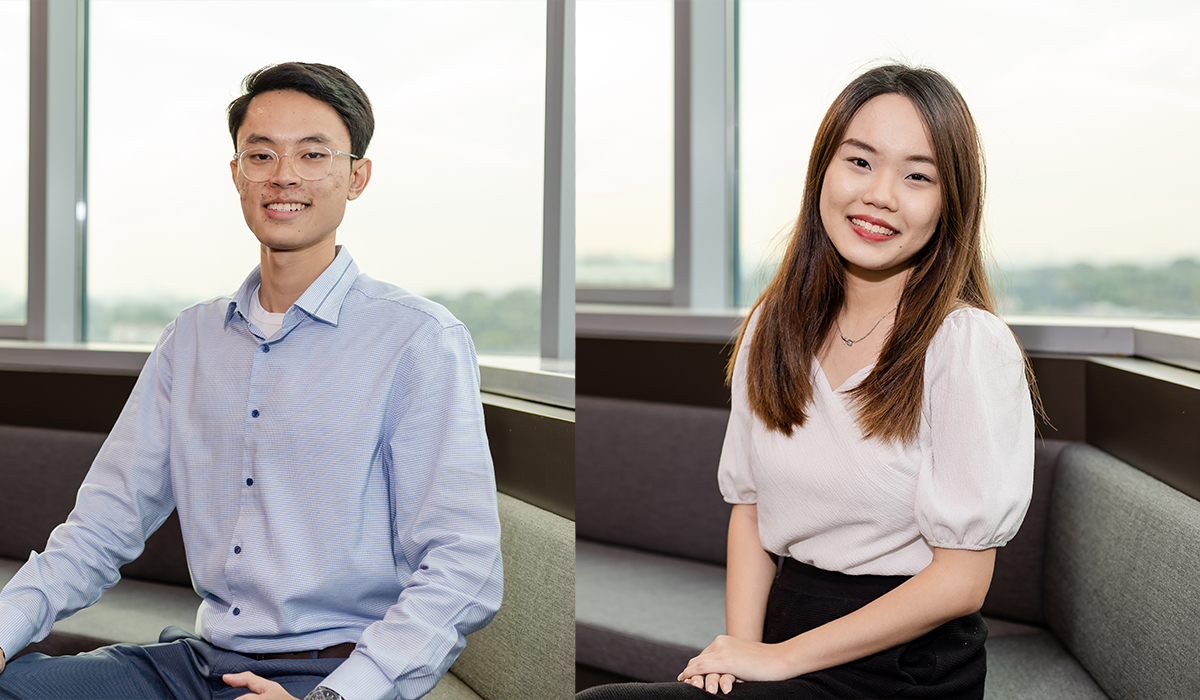Left: Lim Rui Bin works for the SLA as a Senior Executive, Land Sale (Private). He has a First-Class Honours degree in Economics from the London School of Economics and Political Science and is an SLA Overseas Undergraduate Scholar.
Right: Hoong Li-Ann is a Senior Geospatial Consultant working for the SLA. She holds a First-Class Honours degree in Geography with a minor in Geographical Information Systems from NUS and is an SLA Undergraduate Scholar.
The Singapore Land Authority (SLA) plays a crucial role in optimising one of Singapore’s most precious resources: land. Its roles are both developmental and regulatory, including responsibilities such as developing and marketing state properties, building geospatial data infrastructure and functioning as the national land registration authority.
To manage these responsibilities, the SLA incorporates diverse talents such as SLA Undergraduate Scholars Hoong Li-Ann and Lim Rui Bin, who have both built successful careers within the organisation.
Li-Ann was awarded the SLA Undergraduate Scholarship (Mid-Term) and currently works as a Senior Geospatial Consultant. Her responsibilities include driving Singapore’s geospatial development, facilitating international geospatial engagements and the implementation of the Geospatial Trusted Centre. Her geospatial knowledge is complemented by her Bachelor of Social Sciences (Honours) in Geography with a minor in Geographical Information Systems acquired from NUS.
In his role as a Senior Executive, Land Sale (Private), Lim Rui Bin resolves cases involving alienation, leasing renewal/management and the lifting of title restrictions from private entities. He graduated with a First-Class Honours degree in Economics from the London School of Economics and Political Science (LSE) while under the SLA Overseas Undergraduate Scholarship.
To pursue this passion, you aptly opted for an SLA Scholarship. Could you share more about this scholarship and why you chose it?
Li-Ann: As Singapore’s leading geospatial agency, the SLA is at the forefront of the industry and its ongoing developments. Working there allows aspiring geospatial professionals, like myself, to be involved in many exciting geospatial initiatives.
The SLA offers opportunities for its scholars to engage in meaningful and interesting work, and many of my friends and fellow SLA Scholars have ended up working in different departments where we can explore our various interests and passions.
Rui Bin: The scholarship provides opportunities and exposure to take on important portfolios and gives you that “real feel” on what it is like to work on key government projects. I was drawn to this opportunity to work in a key historic organisation like the SLA and to be able to work on land-use issues. It has been quite inspiring to see how the daily work of my colleagues and I play a key role in Singapore’s future land use planning.
With several geospatial agencies in Singapore, what made you chose to work at the SLA in particular?
Li-Ann: At the SLA, the key geospatial agency in Singapore, there are countless opportunities for exciting geospatial work. Through the development of the Singapore Geospatial Masterplan, the SLA oversees and drives geospatial use across the entire nation. The events it hosts, such as the Singapore Geospatial Festival, enable us to connect and work alongside like-minded geospatial experts across the industry and the globe.
We also work closely with other agencies to drive geospatial development and improve the distribution of geospatial data.
Rui Bin: I believe land is one of Singapore’s most important resources, given its scarcity, and SLA has played an integral (and underrated) role in helping to create the right land environment to support economic growth.
In essence, SLA manages the land life cycle, which includes: Land in – when land is returned to the State, Land Out-when land is sold to the public or other public agencies, as well as the interim and creative uses of state land. Therefore, our stakeholders often include other government agencies, the public and real estate developers. This opportunity to not only learn about land use in Singapore, but also hone intangible soft skills, drew me to work with the SLA.
Working at the SLA must be quite fulfilling for you. On that note, could you tell us about your current role and responsibilities?
Li-Ann: Geospatial is a key enabler in working towards a smart and sustainable Singapore. As a Senior Geospatial Consultant, I work with stakeholders from various backgrounds in geospatial planning and policy. In my day-to-day work, I coordinate and communicate initiatives involving these stakeholders, both within and outside the government, as well as outside Singapore. These enable the wider adoption of geospatial across multiple sectors of society, ranging from education to the environment.
Rui Bin: I am currently working under the SLA’s Land Sale (Private) Division as a Senior Executive. Since joining, I have handled both routine and complex cases. In my daily work, I process cases related to lease renewal, lifting of title restrictions and alienation of remnant land. The work in my department is important and outcomes on the community are very tangible since SLA’s actions will directly influence the decisions of developers and other private entities.
How has the SLA scholarship supported your career?
Li-Ann: I am constantly learning from fellow geospatial enthusiasts and experts in the SLA, some of whom pioneered the use of geospatial technology and data in the public service. This directly builds on my knowledge acquired on urban technology and geospatial data during university.
Rui Bin: The scholarship enabled me to pursue my studies at the LSE with peace of mind as I knew I would have a guaranteed job placement after graduation.
Taking up the scholarship helped me stay open-minded during my studies and explore other things that the LSE had to offer. I was able to pursue my other academic interests through modules such as the advanced Statistics modules - Stochastic Simulation and Stochastic Processes. While this may not hold direct relevance to my current work, honing my quantitative skills during my undergraduate studies has helped me to think analytically and respond faster on my feet at work.
What are your future career goals?
Li-Ann: I aim to encourage the mainstream use of geospatial solutions to inform urban policy decision-making, as spreading awareness of the potential of geospatial can improve everyday life.
Rui Bin: I hope that, through my work at the SLA, I can make meaningful contributions to Singapore. I aspire to stay open-minded and expose myself to different tasks to improve my existing skill sets and expertise. I am also in the midst of exploring my career interests and staying open to different possibilities.



